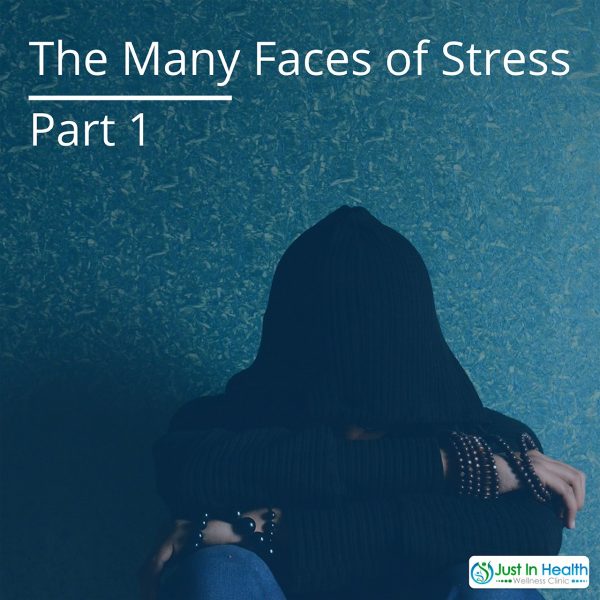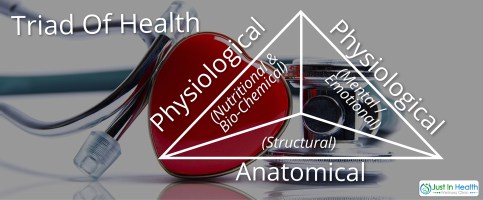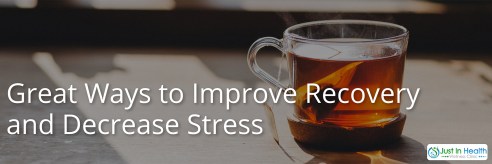The Many Faces of Stress | Part 1

By Dr. Justin Marchegiani
When I say we’re going to talk about stress today, you are probably thinking of emotional or mental stress. Struggling to pay the bills, difficulty in your relationship and the death of a loved one are all very real examples of emotional and mental types of stress. These stressors definitely take a toll on you, and it is my goal to make sure you are equipped with as many tools as possible to turn stress into speed bump rather than a roadblock.
However, there are other hidden stressors that we don’t talk much about, ones that we will be focusing on today: physiological stressors.
Stress can be simplified into three categories:

You can see that stress is more than just mental/emotional, it can also be physical/structural (like a broken bone), and physiological- nutritional/biochemical (which we will be focusing on today).
Click here to find out how you can reduce stress.
Physiological Stress: This type of stress commonly comes from 3 areas.
- Food: Nutrient density, blood sugar stability, and food allergens.
- Eating high quality nutrient dense foods is very helpful in providing the raw materials your body needs to recover from daily stress. Our bodies are in a constant balance of building up and breaking down; as long as we build up faster than we break down, we can stay in a state of “healthy aging” rather than “accelerated aging.”
Remember: The human brain is roughly 60% fat! I find many people today are fat-phobic and are worried about fat causing heart disease. Because of this misinformation, many patients are deficient in important building blocks and are walking around with brains that aren’t functioning optimally.
- If Parkinson’s, Alzheimer, Multiple Sclerosis, or any other neurological condition runs in your family it’s really important that you avoid common food allergens. Scientific literature and research studies repeatedly find gluten, grains, and other common food to affect and accelerate the breakdown of certain parts of your brain.
Thankfully we now have tests that can actually predict up to a decade in advance if this is happening to you, which gives us the time to make the changes to help reverse these conditions from progressing. Removing all grains is a good start, and if anyone interested in running these new state of the art lab tests, please contact the clinic.
- When your blood sugar fluctuates up and down, we typically will see your energy or mood fluctuate in the same pattern. Fueling your body with with protein and fat every 3-5 hours helps blunt these blood sugar and mood swings and lowers the amount of stress hormone our body produces. Many patients I see live their lives on a blood sugar roller coaster and don’t know how to get off this dangerous ride.
- Toxins: Heavy metals, pesticides, xenoestrogens, molds, radiation etc.
- Did you know that about 2 billion pounds of chemicals are dumped into our environment every year? Most of these chemicals are hormone mimickers, commonly “xenoestrogens,” meaning they are very similar to the estrogen hormones in our body.
The environmental exposure to these xenoestrogens throws our body into a state of estrogen dominance, which makes it easy to develop weight gain, hormonal imbalances, and PMS to name just a few.
- Heavy metals like mercury, which are common in silver filling that your typical dentist would use to fill a cavity, are known to have a negative effect on thyroid function and can cause low energy and weight gain.
- Since we are constantly exposed to these widespread damaging compounds, it’s smart to do an integrative detox program to help get these chemicals out of our body. Check out the detoxification portion of this blog post to get started.
- Infections: Parasites, fungus, bacteria and viruses.
- As our immune system becomes weakened due to the stressors above, parasites, fungus, bacteria, and viruses see an opportunity to infect you. It’s usually during stressful times in our life that we are most susceptible. It’s important to note that about 50% of people that develop a parasitic infections don’t even experience gastrointestinal symptoms.
- Travelers abroad have an increased risk of infection. Having high quality digestive enzymes, drinking bottled water, and avoiding any local places that may look a little suspicious can also help.
- It is a good prevention tactic to check about once per year to make sure you don’t have any of these critters lingering inside. Any time you are experiencing excessive gas or bloating, even with a healthy diet and lifestyle, it is wise to get checked.
Great Ways to Improve Recovery and Decrease Stress:

- Chamomile tea before bed.
- 800mg of magnesium before bed.
- Get your adrenal-cortisol rhythm checked (this looks at your stress hormones through the day and how they fluctuate).
- Stool test for GI infections.
- Keep “Bach Flower Essence” by your desk and anytime someone drives you crazy, take 4 sprays.
- Chiropractic treatment and/or a massage can help decrease the body’s flight or fight response, and help it to relax and repair.
- Heart Math Em-Wave2, more on this in posts to come. I just bought one and I really enjoy it!
Stay tuned for the next post in this series on stress, which will focus on the “Physical/Structural” side of the stress triangle.
Click here for help eliminating physiological stressors.



